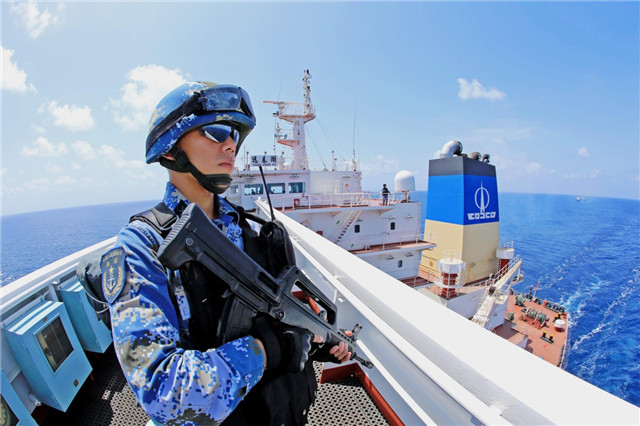
A special forces member performs patrol duties aboard a Chinese oil tanker in 2015. [Photo/Xinhua]
Beijing will never follow the beaten track of big power seeking hegemony, white paper says
China will never seek hegemony, expansion or spheres of influence, and the People's Liberation Army will continue to develop its capability with a "reasonable and appropriate" budget to protect national interests and world peace, a defense white paper published on Wednesday said.
The white paper, on China's national defense, published by the Information Office of the State Council, is the 10th of its kind since 1998 and the first comprehensive one since the 18th National Congress of the Communist Party of China in 2012.
"The development of China's national defense aims to meet its rightful security needs and contribute to the growth of the world's peaceful forces," the paper said.
"History proves and will continue to prove that China will never follow the beaten track of big powers seeking hegemony. No matter how it will develop, China will never threaten any country or seek any sphere of influence."
Senior Colonel Wu Qian, a spokesman for the Ministry of National Defense, said the PLA has expanded its global outreach via cooperation and humanitarian missions, but such a trend is not at odds with China's commitment to following the path of peaceful development.
"The PLA stepping onto the world stage is to effectively protect China's overseas interests and provide more public security services in adherence with common expectations of the international community," he said. "In other words, the PLA brings security, not threat; opportunity, not challenge to the world."
The white paper acknowledges that China still has a wide gap between its defense spending and fulfilling its international responsibilities and obligations as a major country.
From 2012 to 2017, China's defense budget increased from 669.19 billion yuan to 1.04 trillion yuan ($97.4 billion to $151.6 billion). The ratio of China's annual defense spending to GDP fell from a peak of 5.43 percent in 1979 to 1.26 percent in 2017, it said, and the ratio of the defense budget to total government expenditures decreased from 17.37 percent in 1979 to 5.14 percent in 2017.
Colonel Zhou Zhou, a postdoctoral fellow at the PLA Academy of Military Science, said that in the past few decades, China has witnessed steady and moderate growth in its defense expenditure, which has grown in tandem with the overall development of the national economy and government spending.
In the global context, China had the world's second-largest military budget in 2017, but it was less than a quarter of that of the United States. From 2012 to 2017, China's average annual defense expenditure was around 1.3 percent of GDP. The US figure was 3.5 percent, with Russia at 4.4 percent, India at 2.5 percent, and the United Kingdom at 2 percent, the white paper said.
"These figures and indicators show that our nation's defense spending has been growing moderately and still has reasonable room to grow," he said. "They also reflect our consistent commitment to our national defense policy, which is defensive in nature."
At the same time, the white paper proposed for the first time that actively contributing to the building of a community with a shared future for mankind is the global significance of China's national defense in the new era.
The white paper said China has engaged in friendly military exchanges with more than 150 countries, and in 54 exchange and dialogue mechanisms with 41 countries and international organizations.
By December 2018, the PLA had deployed more than 39,000 personnel to 24 United Nations peacekeeping operations. China also had trained more than 1,500 peacekeeping personnel for dozens of other countries.
The naval hospital ship CNS Daishandao, also known as the Peace Ark, has visited 43 countries and treated more than 230,000 people since 2009.
Lieutenant Colonel Tong Zhen, an expert on foreign military affairs from the PLA Academy of Military Science, said the world is generally peaceful, but various security uncertainties and threats are emerging and no country can tackle them alone.
"The PLA is actively shouldering its international responsibilities and duties commensurate with a major military power," she said. "It has been and will continue to be a staunch ally for world peace, and a bridge builder for regional and global security cooperation."




